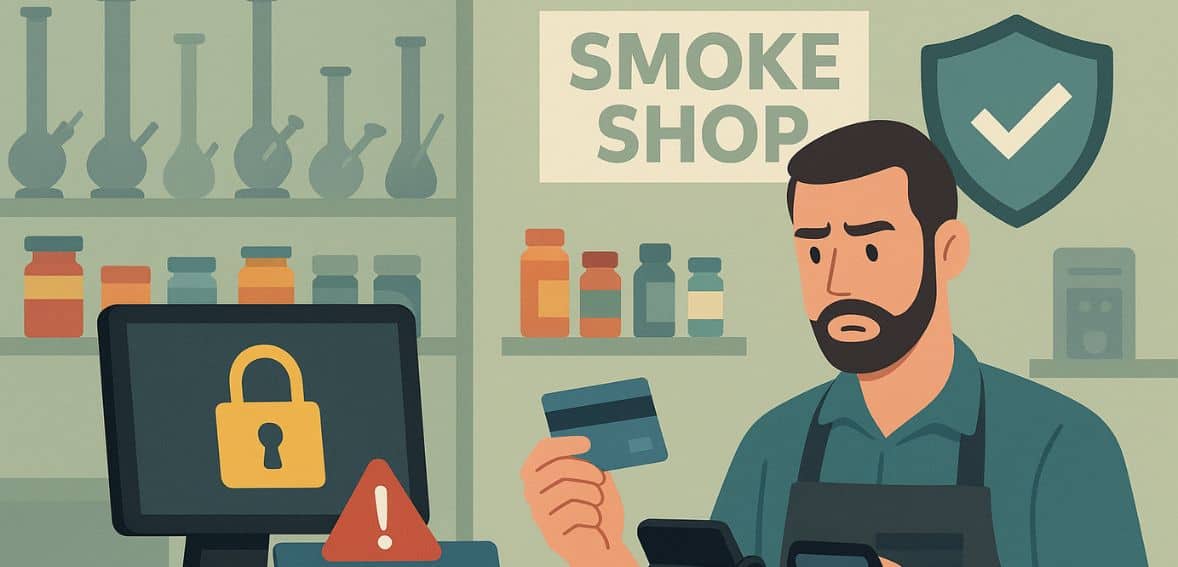
By Janson Kindley July 23, 2025
Smoke shop owners face a unique challenge: legal products, loyal customers, but often unstable payment access. Due to the high-risk reputation of the industry, which is fueled by regulated products, perception problems, and chargeback vulnerability, a single payment processor issue has the potential to completely disrupt business operations.
Not only is a frozen account or abrupt suspension a technical glitch, but it also jeopardizes cash flow, vendor payments, and customer confidence. To maintain your doors open and your reputation intact, this article explores practical strategies for avoiding scams, reducing chargebacks, selecting the most suitable processor, and building payment resilience.
Why Smoke Shops Face Elevated Payment Risks

Banks and processors frequently place fully compliant smoke shops in high-risk categories. This is because certain product categories that are connected to tobacco, vaping, CBD, or paraphernalia draw regulatory attention. Even when sold lawfully, the changing legal environment surrounding substances like Delta-8 THC or CBD can raise red flags. Processors are concerned that a single state-level modification might render previous transactions incompatible with the law.
Many mainstream processors are reluctant or quick to close an account at the first sign of a compliance issue because of this ongoing uncertainty. Additionally, smoke shops are thought to be more likely to receive chargebacks from customers who are unhappy with the performance of their products or who are perplexed by billing descriptors. If there are too many chargebacks, a processor may freeze money or abruptly close the account.
Choosing a Processor Built for Your Industry
Choosing a payment processor that specializes in high-risk merchants is essential to overcoming these obstacles. A dedicated processor is familiar with smoke shop dynamics, product categories, and federal regulations, as opposed to aggregation services like Square or PayPal, where your store’s processing is concealed under a general merchant umbrella. These providers conduct thorough onboarding, requiring documents like business licenses, product lists, compliance policies, and payment disclosures.
This early understanding helps avoid sudden suspensions later, even though approval might take longer. In order to ensure that your business model is not surprising, a high-risk merchant provider also frequently offers chargeback monitoring, fraud protection tools, and frequent compliance reviews. Instead of depending on opaque algorithms, you establish a relationship when your processor is in line with your vertical.
Strengthening Compliance with Industry Regulations

Maintaining compliance requires constant commitment. Every credit card processor requires strict ID checks or online age-gate systems to confirm that customers are 21 years of age or older, so age verification is not optional. Federal and state laws—like the PACT Act, FDA rules, and local licensing—highlight how critical regulatory compliance is to your payment processor’s trust and your store’s eligibility. You must remain aware of changing local laws that could impact payment eligibility if your product line includes CBD products or vape hardware.
This is where having clear documentation is helpful: license copies, store inventory policies, refund guidelines, and website terms should all be up to date and easily provided to your processor upon request. Professionalism is demonstrated by keeping oneself audit-ready, which also helps avoid unexpected freeze decisions brought on by merchant reviews or regulatory changes.
Preventing Chargebacks and Fraud Before They Happen
One of the main reasons for account freezes is chargebacks. Due to unclear billing statements, delayed shipments, or product dissatisfaction, customers may contest charges. Your risk score can rise by just a few points month. By making sure billing descriptors correspond with your store name, displaying return policies at checkout, providing timely customer service, and providing clear refunds, you can lower the number of disputes.
Unauthorized or stolen card use can be identified with fraud prevention tools such as Address Verification System (AVS) and CVV2 code enforcement. Geolocation tracking or velocity checks can be used to identify suspicious orders early. Certain processors provide artificial intelligence (AI)-powered fraud detection systems that spot odd trends, like numerous orders from various cards at the same IP address or large purchases that deviate from normal order volumes. Maintaining account health is facilitated by being proactive.
Riding Volume Spikes Without Tripping Alerts
Even though an increase in sales is good, if it isn’t coordinated with your payment provider, it could be interpreted as reckless behavior. Events that push volume well above your norms include vape restocks, promotions, and holiday traffic. The processor’s automated systems may freeze the account if this spike isn’t reported because they may suspect fraud or account takeover.
Processing will run more smoothly , there won’t be any surprises if you keep the line open with your processor and notify them before significant volume surges. To temporarily modify risk thresholds, some processors even let you forecast volume or announce impending promotions. Stops, delays, and excessive investigations are prevented thanks to this transparency.
Understanding Rolling Reserves and Fund Holds

The imposition of rolling reserves or fund holds by payment processors is another risk that many smoke shop owners face, particularly when their business is classified as high-risk. A rolling reserve is a portion of every transaction that the processor holds back for a predetermined amount of time, usually 90 to 180 days.
It serves as a safety net for money in the event of chargebacks, refunds, or disputes. Even though this practice is widespread in high-risk industries, many business owners are not aware of it until money is unexpectedly withheld. It’s critical to understand your merchant agreement and inquire about fund hold policies up front.
If they notice unusual activity or receive complaints, some processors temporarily freeze large amounts. You can better plan your cash flow and prevent surprises by carefully going over the terms of your contract. It’s another reason why working with a transparent, experienced high-risk provider is key—they’ll explain these policies clearly before you sign on.
Building Backup Resilience and Diversifying Channels
There are risks, no matter how cautious you are. Because of this, savvy shop owners keep a backup merchant account with a second processor, ideally under a different bank or payment rail. The business can continue using the backup provider if one account stops processing or has money in it. This redundancy ensures that you are not entirely dependent on a single system, which is a type of financial resilience.
Diversifying payment channels also matters: offering digital wallets like Apple Pay, ACH, or e-check payments provides flexibility to customers and reduces reliance on a single card network. When a processor is subject to a compliance review or policy changes, diversification helps to avoid complete outages.
Monitoring Metrics and Maintaining Transparency
Strong account health begins with data. Dashboards monitoring monthly volume, chargeback ratios, refund rates, dispute timelines, and average ticket sizes are provided by the majority of specialized processors. You can identify trends early by routinely analyzing these metrics.
Before problems arise, a gradually increasing chargeback rate or an unusual refund surge can be addressed, possibly with changes to the policy or customer service initiatives. Communicating changes to your processor, like introducing new product lines or entering the e-commerce space, is another way to maintain operational transparency. When they aren’t taken by surprise, they are more adaptable.
Training Staff and Documenting Policies
Front-line employees represent your risk profile, too. Your entire account may be compromised if employees fail to use accurate billing descriptors, process refunds appropriately, or verify your age. Legal age requirements, return policies, and how to coolly handle customer cancellation or refund requests must all be covered in training.
These interactions should be governed by written policies that are available and documented. Consistency is increased when managers can track actions using transaction logs and employees can consult training materials. This internal discipline lowers internal errors that could result in disputes and sends a professional message to your processor.
Securing Your System with Technology and Encryption

Modern security standards must be met by the payment infrastructure. To protect cardholder data, your gateways and hardware must be PCI-DSS compliant and use tokenization and end-to-end encryption. A processor that offers hardened security—such as encrypted POS terminals, secure e-commerce APIs, and regular vulnerability checks—protects both your business and your customers.
This technological investment lowers the likelihood of data breaches, which result in penalties and erode processor confidence. Credibility of compliance is further increased by documenting your technology stack and security procedures.
Real‑World Lessons from Industry Operators
Payment processing professionals’ Reddit threads expose actual delays: weeks of waiting, repeated denials, or removals of merchant accounts belonging to smoke shop owners because of past bankruptcies or product mix, such as delta-8 THC items. According to one representative, working with ISOs that have strong high-risk underwriting and a variety of banking relationships is the only way to get quick approvals. These accounts highlight the significance of selecting a processor with extensive vertical experience—the type that can handle credit history concerns, understands the subtleties of product legality, and provides multiple bank access points to guarantee account stability.
Conclusion: Protecting Your Store, Your Reputation, and Your Cash Flow
In the current financial and regulatory environment, running a smoke shop requires more than just cash register savvy—it also calls for an advanced payment strategy. You need to work with a provider right away who understands high-risk situations and will help your company succeed in the long run. A safer payment profile is a result of strict age verification, chargeback control, fraud prevention measures, compliance with local and federal laws, and open lines of communication.
You can bounce back from disputes or suspensions fast if you have backup accounts, a variety of payment methods, and trustworthy metrics. Professionalism is demonstrated by staff training, technology security, and policy documentation. Your smoke shop not only reduces downtime but also fosters trust with banks, vendors, and customers when your payment operations are purposefully designed with foresight and adjusted to evolving regulations. Instead of becoming existential threats, scam attempts, freezes, or abrupt terminations becomes an infrequent occurrence.